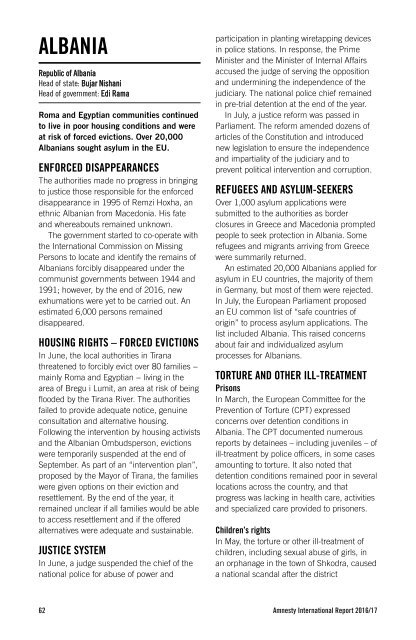AMNESTY INTERNATIONAL REPORT 2016/17
2lEHU9j
2lEHU9j
You also want an ePaper? Increase the reach of your titles
YUMPU automatically turns print PDFs into web optimized ePapers that Google loves.
ALBANIA<br />
Republic of Albania<br />
Head of state: Bujar Nishani<br />
Head of government: Edi Rama<br />
Roma and Egyptian communities continued<br />
to live in poor housing conditions and were<br />
at risk of forced evictions. Over 20,000<br />
Albanians sought asylum in the EU.<br />
ENFORCED DISAPPEARANCES<br />
The authorities made no progress in bringing<br />
to justice those responsible for the enforced<br />
disappearance in 1995 of Remzi Hoxha, an<br />
ethnic Albanian from Macedonia. His fate<br />
and whereabouts remained unknown.<br />
The government started to co-operate with<br />
the International Commission on Missing<br />
Persons to locate and identify the remains of<br />
Albanians forcibly disappeared under the<br />
communist governments between 1944 and<br />
1991; however, by the end of <strong>2016</strong>, new<br />
exhumations were yet to be carried out. An<br />
estimated 6,000 persons remained<br />
disappeared.<br />
HOUSING RIGHTS – FORCED EVICTIONS<br />
In June, the local authorities in Tirana<br />
threatened to forcibly evict over 80 families −<br />
mainly Roma and Egyptian − living in the<br />
area of Bregu i Lumit, an area at risk of being<br />
flooded by the Tirana River. The authorities<br />
failed to provide adequate notice, genuine<br />
consultation and alternative housing.<br />
Following the intervention by housing activists<br />
and the Albanian Ombudsperson, evictions<br />
were temporarily suspended at the end of<br />
September. As part of an “intervention plan”,<br />
proposed by the Mayor of Tirana, the families<br />
were given options on their eviction and<br />
resettlement. By the end of the year, it<br />
remained unclear if all families would be able<br />
to access resettlement and if the offered<br />
alternatives were adequate and sustainable.<br />
JUSTICE SYSTEM<br />
In June, a judge suspended the chief of the<br />
national police for abuse of power and<br />
participation in planting wiretapping devices<br />
in police stations. In response, the Prime<br />
Minister and the Minister of Internal Affairs<br />
accused the judge of serving the opposition<br />
and undermining the independence of the<br />
judiciary. The national police chief remained<br />
in pre-trial detention at the end of the year.<br />
In July, a justice reform was passed in<br />
Parliament. The reform amended dozens of<br />
articles of the Constitution and introduced<br />
new legislation to ensure the independence<br />
and impartiality of the judiciary and to<br />
prevent political intervention and corruption.<br />
REFUGEES AND ASYLUM-SEEKERS<br />
Over 1,000 asylum applications were<br />
submitted to the authorities as border<br />
closures in Greece and Macedonia prompted<br />
people to seek protection in Albania. Some<br />
refugees and migrants arriving from Greece<br />
were summarily returned.<br />
An estimated 20,000 Albanians applied for<br />
asylum in EU countries, the majority of them<br />
in Germany, but most of them were rejected.<br />
In July, the European Parliament proposed<br />
an EU common list of “safe countries of<br />
origin” to process asylum applications. The<br />
list included Albania. This raised concerns<br />
about fair and individualized asylum<br />
processes for Albanians.<br />
TORTURE AND OTHER ILL-TREATMENT<br />
Prisons<br />
In March, the European Committee for the<br />
Prevention of Torture (CPT) expressed<br />
concerns over detention conditions in<br />
Albania. The CPT documented numerous<br />
reports by detainees – including juveniles – of<br />
ill-treatment by police officers, in some cases<br />
amounting to torture. It also noted that<br />
detention conditions remained poor in several<br />
locations across the country, and that<br />
progress was lacking in health care, activities<br />
and specialized care provided to prisoners.<br />
Children’s rights<br />
In May, the torture or other ill-treatment of<br />
children, including sexual abuse of girls, in<br />
an orphanage in the town of Shkodra, caused<br />
a national scandal after the district<br />
62 Amnesty International Report <strong>2016</strong>/<strong>17</strong>


